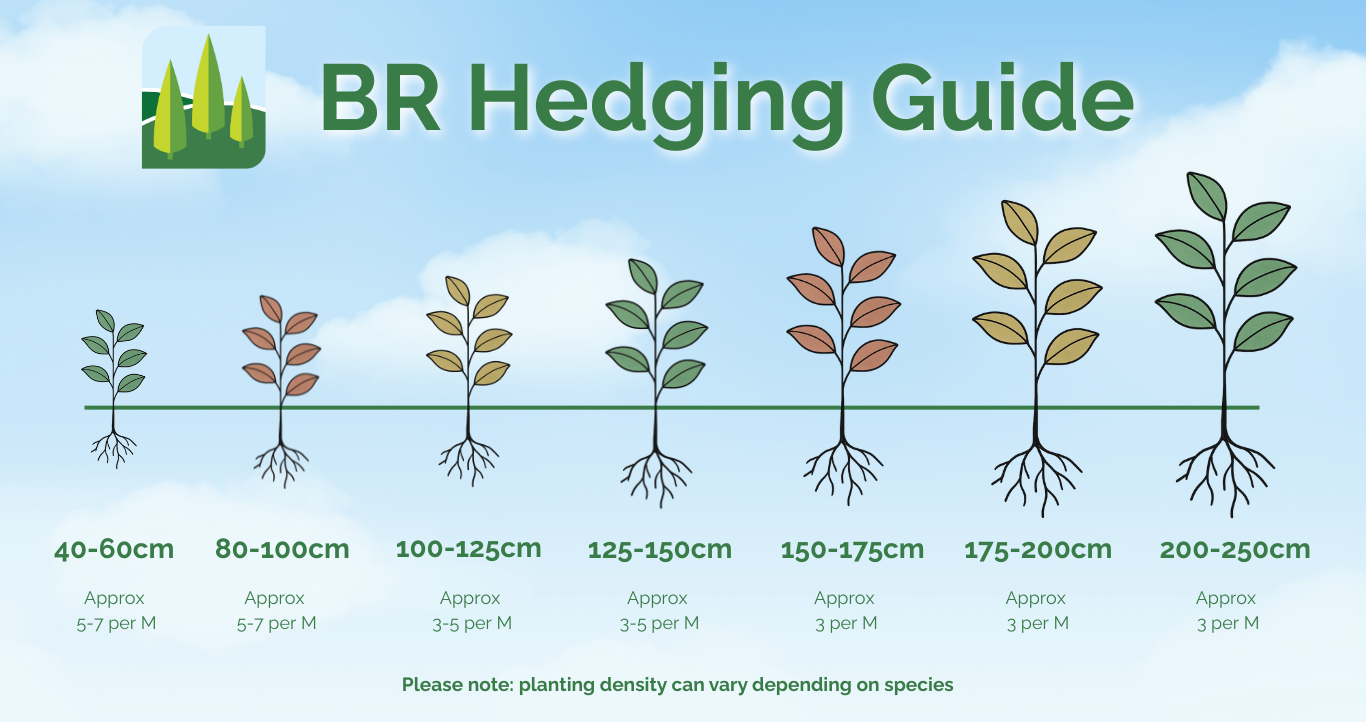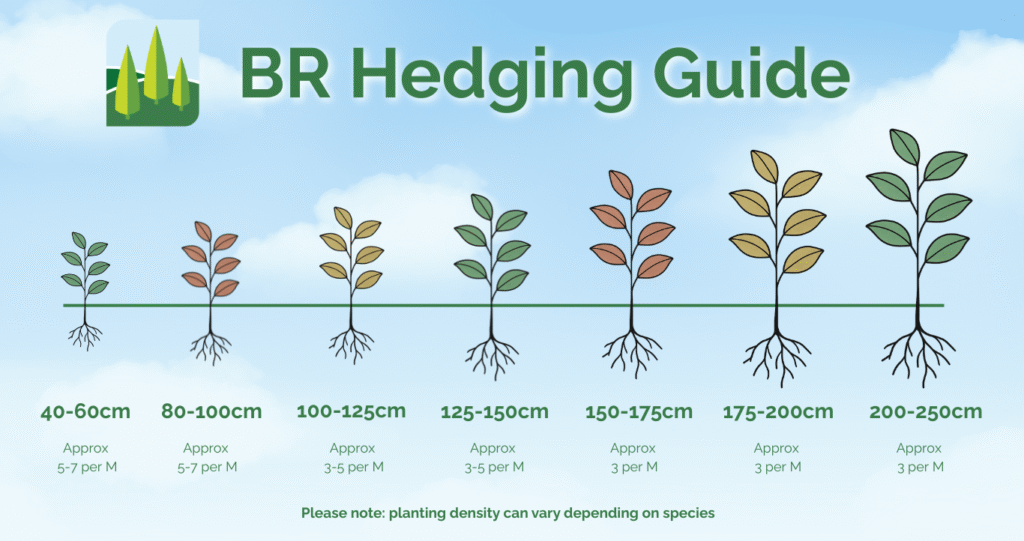
Selecting the right type of hedging — whether for screening, structure, or instant impact — depends on your timing, budget, and project goals. Below, we’ve outlined the main types of hedging available, planting advice, and spacing guidance to help you plan with confidence.

Bare Root
The most cost-effective option for planting young hedging or forestry plants. Bare root hedging is only available from November to March, when plants are dormant. It’s commonly used in large-scale or budget-sensitive planting schemes.
Size Range: Typically 40–60cm up to 200–250cm for deciduous species; up to 100cm for evergreen varieties
Best For: Mass planting, rural or naturalistic schemes, cost-effective hedging

Root Balls
Rootball hedging is supplied with the root system wrapped in soil and hessian to reduce transplant shock. These are generally larger, more mature plants than bare root options and establish well with proper aftercare.
Available: November to March
Common Uses: Evergreen or deciduous hedging with stronger branching and multiple stems
Advantages: Reduced root disturbance, better success rate for mature planting

Pot Grown
Pot-grown hedging is available year-round and comes in a wide range of sizes. With a fully developed root system contained in soil, these plants have a high success rate, particularly in evergreen varieties.
Best For: Flexible planting times, urban landscapes, small projects
Advantages: Minimal transplant shock, available all year

Instant hedging
Ideal for clients who want an immediate impact, instant hedging is supplied in dense, ready-made lengths — often 1 metre sections — and provides an immediate screen or boundary.
Form: Field- or pot-grown
Specification: Supplied by height, width, and depth
Best For: Privacy, show gardens, high-spec developments

Clipped hedging units
Rootball or pot-grown hedging that has been trimmed and maintained over time to create a neat, dense shape. These are ideal for achieving a semi-instant effect.
Specification: Should be specified in three dimensions (height, width, depth) for accuracy
Used For: Formal hedging, topiary edges, and architectural planting

Deciduous hedging offers a natural-looking, seasonal boundary that supports wildlife and changes beautifully with the seasons. These plants drop their leaves in winter but often provide vibrant autumn colour beforehand.
Availability: Container-grown year-round, or as bare root plants from November to March
Acer campestre (Field Maple)
Carpinus betulus (Hornbeam)
Crataegus monogyna (Hawthorn)
Fagus sylvatica (Green Beech)
Fagus sylvatica ‘Purpurea’ (Purple Beech)
Prunus spinosa (Blackthorn)

Evergreen hedging keeps its foliage year-round, making it ideal for privacy screening, noise reduction, and structural planting. It provides consistency through winter and often supports wildlife as shelter or habitat.
Availability: Container-grown year-round or as rootball plants November to March
Prunus rotundifolia (Cherry Laurel)
Taxus baccata (Yew)
Ilex aquifolium (Holly)
Buxus sempervirens (Box)
Photinia ‘Red Robin’
Prunus lusitanica (Portuguese Laurel)
Use the chart below to estimate how many plants you’ll need per metre based on plant height and root type:

| SEE | Seedling |
| TRA | Transplant |
| TRF | Feathered Transplant |
| BR | Bare root |
| RB | Root Ball |
| WRB | Wired Root Ball |
| 1 + 0 | 1-year seedling |
| 0 + 1 | 1-year hardwood cutting |
| 1 + 1 | 1-year seedling transplanted for 1 year |
| 1 + 2 | 1-year seedling transplanted for 2 years |
| Heights | Root | Plants Per M |
|---|---|---|
| 20-30cm | BR/P9 | approx 5-7. |
| 40-60cm | BR | approx 5-7. |
| 60-80cm | BR | approx 5-7. |
| 80-100cm | BR | approx 5-7. |
| 80-100cm | RB | approx 2-3. |
| 100-125cm | BR | approx 3-5 |
| 100-125cm | RB | approx 2-3 |
| 125-150cm | BR | approx 3-5. |
| 125-150cm | RB | approx 2. |
| 150-175cm | BR | approx 3 |
| 150-175cm | RB | approx 1-2. |
| 175-200cm | BR | approx 3 |
| 175-200cm | RB | approx 1-2. |
| 200-250cm | BR | approx 3 |
| 200-250cm | RB | approx 1 |